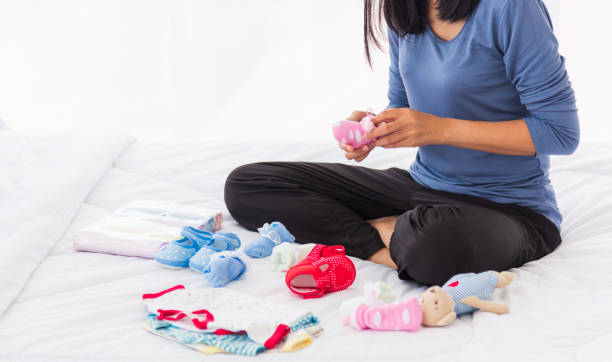The “Oh My Goodness, What Now?” Moment
Your baby’s here. The hospital bag is empty, your heart is full, and your brain? Well, it’s somewhere between floating in a happy fog and panicking because you have no idea what you’re doing.
Take a breath. Every parent, yes, even the ones who look like they have it all figured out, starts here. You’ll fumble, you’ll figure it out, and you’ll surprise yourself with how instinctive some things feel. And the rest? That’s what this little guide is for.
1. Setting Up the Nest – Baby Gear You’ll Use
Here’s the thing: baby stores are designed to make you believe your newborn needs a NASA-level sleep pod and a closet bigger than yours. Truth? You just need a few key items.
Must-haves for everyday survival:
- Safe sleep space: crib, bassinet, or bedside sleeper that meets safety standards.
- Swaddles or sleep sacks: because babies love feeling snug.
- Soft cotton onesies: short and long-sleeved, depending on the season.
- Diapers & wipes: a lot of them. More than you think.
- A changing mat: portable ones are lifesavers.
Things that often gather dust:
- Wipe warmers (cute idea, but babies survive room-temp wipes).
- Fancy baby shoes (they can’t walk yet).
- Multiple “speciality” gadgets that overcomplicate basic care.
Here’s a small sanity saver: set up mini stations, a basket with diapers, wipes, and a spare onesie, in more than one room. You’ll thank yourself when a blowout happens right there in the living room.
2. Feeding – From Milk Dribbles to Full Bellies
Whether you’re breastfeeding, formula feeding, or a mix of both, there’s no “one right way,” only what works for you and your baby.
Helpful things to have nearby:
- Nursing pillow (even if you bottle feed, it saves your arms).
- Burp cloths, seriously, stash them everywhere.
- A good water bottle for you, feeding is thirsty work.
You’ll hear the term cluster feeding. It’s when your baby suddenly wants to eat every 20–40 minutes, often in the evening. It’s normal, it’s exhausting, and it won’t last forever.
And a quick note for your sanity: not every spit-up is a crisis. Sometimes it’s just your baby’s way of saying, “That was a good meal!”
3. Diaper Duty – The Not-So-Glamorous Side
Newborns can go through 8–12 diapers a day. It’s a lot, and yes, your trash bin will always be full.
Cloth vs. disposable:
- Cloth can save money long-term and is eco-friendly, but it requires extra laundry.
- Disposables are convenient and come in sensitive-skin options.
- Some parents do both, cloth at home, disposables when out.
Preventing diaper rash:
- Change diapers promptly.
- Use a gentle, fragrance-free barrier cream.
- Let baby’s bottom “air out” when possible.
Mini hack: keep a nighttime diaper caddy near your bed so you’re not running to the nursery at 3 a.m. in zombie mode.
4. Sleep – Yours and Theirs
Newborn sleep is well, it’s unpredictable. They can snooze for 16–18 hours a day but in short stretches.
Safe sleep basics:
- Always on their back.
- Firm mattress, fitted sheet, no blankets or toys.
- Room-sharing (not bed-sharing) for at least the first 6 months is recommended by pediatricians.
Gentle settling tricks:
- Swaddle snugly but safely.
- Use white noise, which mimics the womb.
- Warm your hands before placing the baby down.
And yes, “sleep when the baby sleeps” is excellent advice, but sometimes you’ll just want to watch a show or take a long shower instead. That’s okay.
5. Bath Time – Keeping It Simple
Newsflash: newborns don’t need daily baths. Overbathing can dry their skin. Two to three times a week is plenty, with sponge baths in between if needed.
Tips for stress-free baths:
- Check water temp with your elbow (should feel warm, not hot).
- Support the head and neck at all times.
- Have everything within arm’s reach before you start.
If your baby hates baths at first, don’t worry, many grow to love the warm water and splash time.
6. Dressing Your Little One – It’s Not a Fashion Show
Sure, those tiny overalls are adorable, but comfort beats cuteness in the newborn stage.
Go for:
- Soft, breathable cotton.
- Easy snaps or zippers.
- Layering for temperature control.
The “one more layer” rule: dress your baby in one more layer than you’re wearing. If you’re in a T-shirt, they probably need a light blanket or sweater.
At 3 a.m., snaps will feel like your best friend compared to wriggling baby arms into stiff outfits.
7. Soothing & Bonding – Your Secret Superpowers
Every baby cries, and sometimes you’ll try everything before they calm. That’s normal.
Your toolkit:
- Skin-to-skin contact helps regulate the baby’s heartbeat and temperature.
- Gentle rocking or bouncing.
- Soft “shhh” sounds or humming.
- Babywearing with a sling or carrier for hands-free comfort.
Bonding isn’t just cuddles, it’s eye contact during feeding, talking to them, and responding to their little sounds.
8. Health & Safety – The Non-Negotiables
Your paediatrician will become your go-to guide, but here are the basics to have down from day one:
- Learn how to install your car seat correctly (many hospitals check before discharge).
- Keep a digital thermometer handy.
- Store baby meds like infant acetaminophen, but only use them under a doctor’s advice.
- Baby-proofing starts earlier than you think; rolling can happen before you expect.
9. The Emotional Side – You Matter Too
The postpartum period can feel like a roller coaster. Hormones, sleep deprivation, and huge life changes can stir up emotions you didn’t expect.
It’s okay to:
- Say “no” to visitors.
- Accept help without feeling guilty.
- Cry for no clear reason some days.
If you ever feel persistently sad, anxious, or disconnected from your baby, reach out to your doctor, a counsellor, or a trusted friend. You’re not alone.
10. Building Your Support Circle
Parenting feels easier when you’re not doing it solo.
- Lean on family or friends who respect your boundaries.
- Connect with local mom groups or online communities (but avoid comparison traps).
- A lactation consultant, postpartum doula, or even a night nanny can be worth their weight in gold.
11. Common First-Time Mom Worries (and Why You Can Breathe)
- “Is my baby eating enough?” → If they’re gaining weight and having wet/dirty diapers, you’re good.
- “They’re sleeping too much/not enough!” → Newborn patterns vary wildly.
- “Am I doing this right?” → If your baby is safe, fed, and loved, you’re doing just fine.
You’ll make mistakes. Every parent does. And most of the time, your baby won’t remember, or care.
12. The First 3 Months – Survival Mindset
This stage, often called the “fourth trimester,” is about keeping expectations realistic. Your baby is adjusting to life outside the womb, and you’re adjusting to parenthood.
Celebrate the little wins:
- The first genuine smile.
- The night they sleep 4 hours straight.
- The first time you drink your coffee while it’s still hot.
It’s a short season. One day, you’ll look back and realise the nights that felt endless were the days you’d give anything to hold again.
Final Word – You’re Doing Better Than You Think
Your baby doesn’t need a perfect parent; they need you. With all your love, quirks, learning curves, and sleepless nights.
So breathe. You’ve got this. And when you don’t feel like you do? That’s when your village steps in.

